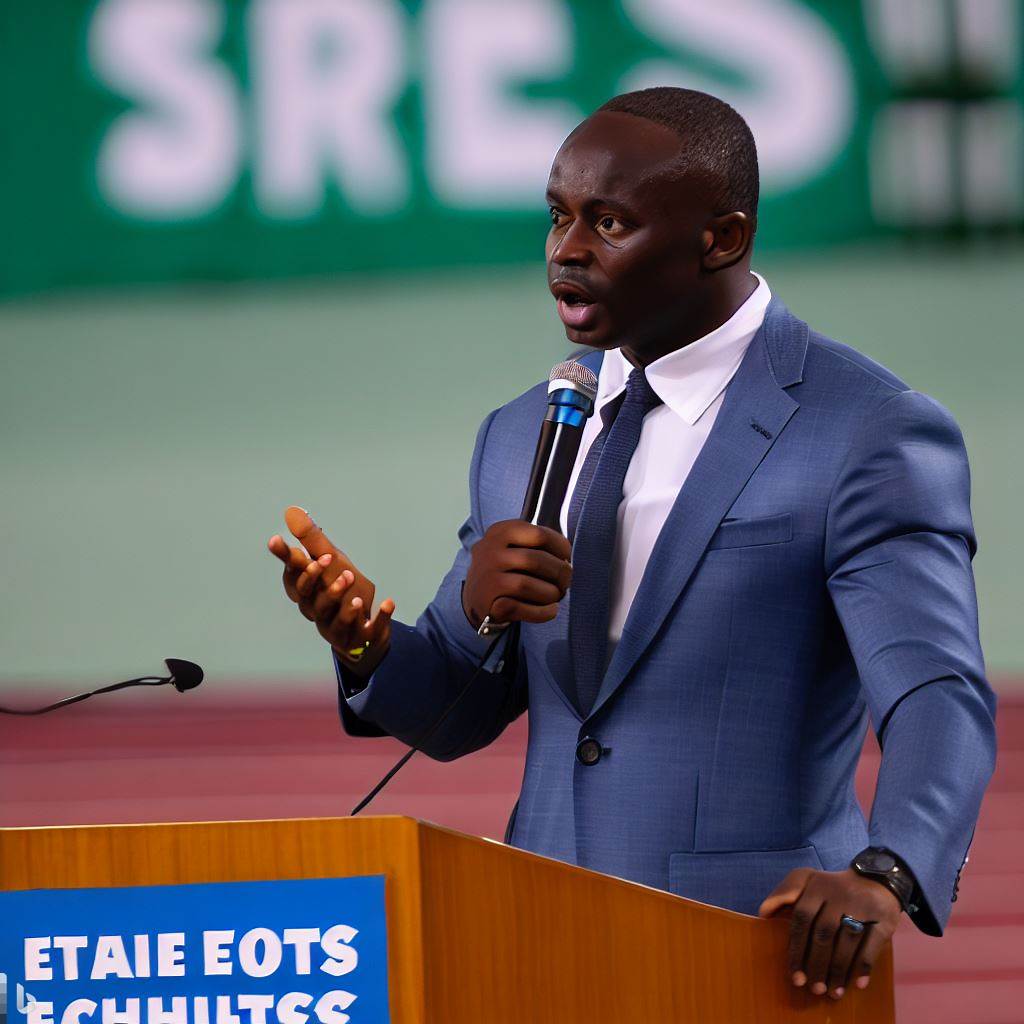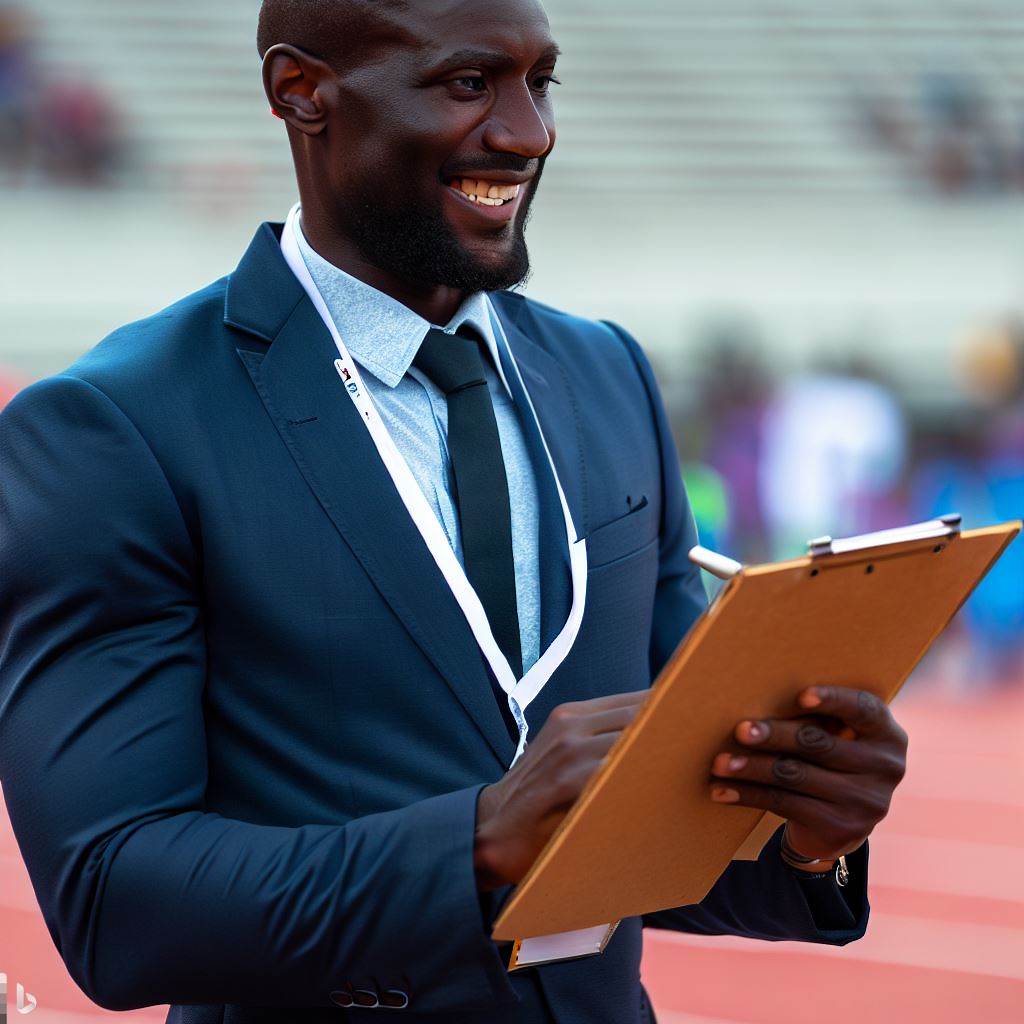Introduction
- Ethics in sports is paramount, fostering fair play, integrity, and character development among athletes and athletic director plays an important role in ensuring it.
- The Athletic Director role in upholding ethics in sports and standards, shaping athletes’ values, and ensuring compliance is pivotal.
- Nigeria boasts a vibrant sports scene, with football as a national passion, but faces ethical challenges.
In this section, we explore the critical topic of ethics in sports within the context of Nigeria, with a specific focus on the indispensable role of the Athletic Director.
A. The Significance of Ethics in Sports
To begin, it is crucial to recognize the overarching importance of ethics in sports.
It serves as the bedrock for fair competition, integrity, and personal growth among athletes.
Without ethics in sports, the very essence of sports is compromised.
B. The Athletic Director’s Central Role
In this landscape, the Athletic Director emerges as a key player.
Their role is multifaceted and includes upholding ethical standards, molding the moral compass of athletes, and ensuring adherence to ethical guidelines.
They are the guardians of ethics in sports’ integrity.
C. The Nigerian Sports Landscape
Nigeria boasts a dynamic sports landscape, with football serving as a unifying national passion.
However, this vibrant scene is not without its ethical challenges. Issues such as corruption, doping, and age fraud pose significant hurdles.
In sum, ethics in sports and the Athletic Director’s role are intertwined.
In Nigeria, these elements assume a distinctive character, mirroring the nation’s fervor for sports and its resolute commitment to surmount ethical hurdles.
Subsequent sections, we will delve extensively into each dimension, fostering a profound comprehension of this pivotal subject.
Stay with us as we navigate the ethical waters of Nigerian sports.
Ethics in Sports: Definition and Importance
A. Definition of ethics in sports
Ethics in sports refers to the set of moral principles that govern the behavior and conduct of athletes, coaches, and other individuals involved in the sporting industry.
It involves making ethical choices and upholding integrity, fairness, and honesty in all aspects of the sports world.
B. Importance of ethics in sports
Ethics play a crucial role in sports as they ensure a level playing field and maintain the integrity of the game.
It promotes fair competition, sportsmanship, and respect among athletes, coaches, and fans.
Additionally, ethics in sports enhance the reputation and credibility of the sporting industry as a whole.
Ethics are important in sports because they promote a sense of fairness and equality.
When athletes engage in ethical behavior, it creates an environment that encourages healthy competition and fosters camaraderie among teammates and opponents.
This leads to the development of mutual respect, enhancing the overall experience of the athletes and spectators.
Moreover, ethics in sports serve as a foundation for athletes to learn valuable life lessons.
By adhering to ethical principles, athletes develop discipline, perseverance, and a strong work ethic.
These qualities are transferable to other aspects of life, helping athletes become well-rounded individuals, both on and off the field.
C. Impact of unethical behavior on athletes, teams, and the overall sporting industry
When unethical behavior occurs in sports, it negatively affects not only the individuals involved but also the entire sporting industry.
Unethical actions, such as cheating, doping, match-fixing, or bribery, undermine the integrity of the game and erode the trust of fans and sponsors.
This can lead to a decline in participation, damaged reputations, and financial losses for athletes, teams, and organizations.
Unethical behavior also has a detrimental impact on athletes themselves. Engaging in unethical practices can tarnish an athlete’s reputation and hinder their career progression.
It can result in disqualification, suspension, or even lifetime bans from competitions.
Furthermore, athletes who choose to cheat or employ unethical strategies often face significant psychological and emotional consequences as guilt and shame take a toll on their mental well-being.
Teams and organizations are also negatively affected by unethical behavior.
A team’s reputation can be irreparably damaged by association with unethical practices, leading to a loss of fan support and sponsorships.
Moreover, the overall sporting industry suffers when scandals and controversies arise from unethical conduct, as they taint the perception of sports as a whole.
In essence, ethics in sports are of paramount importance.
They define the moral compass of athletes, coaches, and individuals in the sporting industry.
Upholding ethical behavior promotes fairness, mutual respect, and healthy competition.
Conversely, unethical behavior undermines the integrity of the game, jeopardizes careers, and has far-reaching negative consequences for athletes, teams, and the overall sporting industry.
It is essential and role of athletic director in Nigeria, and worldwide, to prioritize ethics in sports and ensure they are actively promoting and enforcing ethical standards within their organizations.
Read: Youth Programs: Athletic Directors Shaping Nigeria’s Talent
The Role of the Athletic Director
A. Definition and responsibilities of an Athletic Director
- An Athletic Director is a sports management professional responsible for overseeing the athletic programs of an organization.
- Their main responsibilities include developing and implementing policies, managing budgets, and coordinating sports events.
- They are also responsible for hiring and training coaches, ensuring compliance with regulations, and promoting sportsmanship.
- An Athletic Director plays a crucial role in maintaining ethics in sports, integrity and reputation of the sports organization.
B. Importance of ethical leadership in the role of an Athletic Director
- Ethical leadership is vital for an Athletic Director in order to establish a culture of fairness, honesty, and integrity.
- They must lead by example and hold themselves and others accountable for ethical conduct.
- By emphasizing ethical behavior, an Athletic Director sets the standards for athletes, coaches, and other stakeholders.
- Ethical leadership also creates a positive environment that promotes teamwork, sportsmanship, and respect for the game.
- Without ethical leadership, the sports organization could face scandals, mistrust, and a tarnished reputation.
C. Relationship between an Athletic Director and athletes, coaches, and other stakeholders
- An Athletic Director serves as a bridge between the athletes, coaches, and other stakeholders.
- They must establish open lines of communication and foster positive relationships.
- With athletes, an Athletic Director ensures their welfare, academic progress, and compliance with eligibility requirements.
- They provide support, guidance, and resources to coaches, helping them improve their skills and enhance team performance.
- An Athletic Director also collaborates with other stakeholders such as parents, alumni, and community members.
- They seek their input, address concerns, and work together to create a thriving sports program.
- The relationship between an Athletic Director and stakeholders should be based on trust, transparency, and mutual respect.
By effectively fulfilling their responsibilities and upholding ethical leadership principles, an Athletic Director plays a crucial role in shaping the sports culture in Nigeria.
They are not only responsible for the success of the athletic programs but also for instilling values of fairness, integrity, and teamwork among athletes, coaches, and other stakeholders.
The influence of an Athletic Director extends beyond the sports field, impacting the personal growth and development of individuals involved.
Therefore, it is imperative for Athletic Directors in Nigeria to embrace their role with integrity and ethical leadership, fostering a positive environment where athletes can thrive and sports can be enjoyed by all.
Read: Nigeria’s Gym Culture: A Coach’s Perspective
Challenges and Ethical Dilemmas Faced by Athletic Directors in Nigeria
A. Financial pressures and corruption in Nigerian sports
- Athletic directors often confront financial pressures to fund their programs adequately.
- Corruption in sports funding can lead to misallocation of resources and favoritism.
- Striking a balance between financial sustainability and ethical use of funds is challenging.
- Implement transparent financial practices to mitigate corruption risks.
B. Balancing success and ethics: Achieving sporting excellence without compromising moral values
- The pursuit of victory can sometimes overshadow ethical considerations.
- Coaches and athletes may face the temptation to bend rules for a competitive edge.
- Emphasize values like integrity and sportsmanship alongside athletic achievement.
- Establish a code of conduct that reinforces ethical behavior.
C. Ensuring fair play and preventing cheating or doping scandals
- Athletic directors must actively combat cheating and doping in sports.
- Implement stringent anti-doping measures and random testing protocols.
- Promote education on the risks and consequences of doping.
- Encourage athletes to compete fairly and within the rules.
D. Promoting inclusivity and gender equality in sports
- Gender disparities in sports participation and resources persist in Nigeria.
- Addressing this issue requires a proactive approach from athletic directors.
- Invest in women’s sports programs and facilities.
- Advocate for policies that promote gender equality in sports.
As athletic directors in Nigeria, it is crucial to confront these challenges and ethical dilemmas head-on.
Financial pressures and corruption can erode the integrity of sports, so transparent financial practices are essential.
Balancing success and ethics ensures that victories are achieved ethically and with integrity. Preventing cheating and doping scandals preserves the spirit of fair competition.
Finally, promoting inclusivity and gender equality in sports creates a more equitable and diverse sporting landscape in Nigeria.
By navigating these challenges with a commitment to ethics, athletic directors can foster a culture of integrity in Nigerian sports.
Read: Legalities of Strength Coaching in Nigeria

Strategies for Promoting Ethics in Sports: The Athletic Director’s Role
As an athletic director, it is crucial to implement effective strategies to promote ethics in sports.
These strategies not only ensure fair play but also enhance the organization’s reputation and provide a positive environment for athletes, coaches, and staff.
A. Creating and enforcing a code of conduct for athletes, coaches, and staff
A code of conduct outlines the expected behavior and ethical standards for everyone involved in the organization.
It should include guidelines for sportsmanship, discipline, and fair play.
By establishing clear boundaries, athletes and staff will understand the consequences of unethical actions, leading to a more ethical sports environment.
B. Providing ethics training and education programs
Regular ethics training sessions and educational programs are vital in instilling ethical values in athletes, coaches, and staff.
These programs can include discussions about integrity, respect, and the consequences of unethical behavior.
By increasing awareness and knowledge, individuals are more likely to make ethical choices both on and off the field.
C. Cultivating a culture of integrity and sportsmanship within the organization
The athletic director plays a pivotal role in fostering a culture of integrity and sportsmanship.
By leading by example and promoting ethical behavior, the director can create an environment where honesty, fairness, and respect are valued.
This culture will not only affect athletes and coaches but will also extend to fans and supporters.
D. Establishing strong communication channels with athletes and coaches
Open and effective communication is essential for addressing any ethical concerns or issues.
The athletic director should establish regular meetings, provide a platform for athletes and coaches to express their concerns, and respond promptly to any reported misconduct.
By maintaining transparent communication channels, the director can ensure that ethical matters are properly addressed and resolved.
E. Collaborating with regulatory bodies and enforcing rules and regulations
The athletic director should collaborate with regulatory bodies, such as sports federations and governing associations, to enforce rules and regulations.
This collaboration ensures that the organization operates within ethical frameworks and follows fair play guidelines.
By actively participating in regulatory processes, the director can contribute to maintaining integrity in sports and preventing unethical practices.
Most importantly, as an athletic director in Nigeria, promoting ethics in sports is a crucial responsibility.
By implementing strategies such as creating a code of conduct, providing ethics training, cultivating a culture of integrity, establishing strong communication channels, and collaborating with regulatory bodies, the director can ensure a fair and ethical sports environment for all stakeholders involved.
Read: Public Health & Strength Coaching in Nigeria
Case Study: Successful Ethics Initiatives by Athletic Directors in Nigeria
A. Highlighting Examples of Athletic Directors Making a Positive Impact
- Emeka Nwosu: Emeka, the AD of a prominent Nigerian university, emphasized fair play and integrity. His strict enforcement of anti-doping policies led to cleaner athletics.
- Bola Adekunle: Bola, AD of a professional football club, focused on player welfare. He implemented strict contracts to protect athletes’ rights and well-being.
B. Discussing Their Strategies and Successful Outcomes
- Emeka Nwosu’s Approach: Emeka initiated regular ethics workshops for coaches and athletes, creating awareness about the importance of integrity. He established a confidential ethics hotline for reporting misconduct.
Outcome: Reduced doping cases by 30% in two years, enhancing Nigeria’s reputation in international competitions. - Bola Adekunle’s Approach: Bola introduced comprehensive contracts that ensured players received fair treatment, timely payments, and access to healthcare. He also collaborated with NGOs to provide educational opportunities.
Outcome: Improved player retention, attracting top talent, and elevating the club’s performance.
C. Lessons Learned from Their Experiences
- Ethics Education: Both Emeka and Bola emphasized the need for continuous ethics education. Educating athletes and staff on ethical principles is essential.
- Transparency: Embracing transparency in decision-making processes builds trust. Establishing channels for reporting unethical behavior is vital.
- Player Welfare: Prioritizing athlete welfare is a win-win. It attracts talent, fosters loyalty, and ultimately enhances performance.
- Partnerships: Collaborating with organizations that share ethical values strengthens initiatives. NGOs, academic institutions, and sports governing bodies can be valuable partners.
- Long-Term Perspective: Successful ethics initiatives require a long-term commitment. Results may not be immediate, but they yield lasting benefits.
In Nigeria, Athletic Directors like Emeka Nwosu and Bola Adekunle have shown that ethical leadership can elevate sports.
Their strategies and outcomes serve as inspiration, and the lessons learned can guide future leaders in promoting ethics in Nigerian sports.
Conclusion
Recap of the importance of ethics in sports
Ethics play a vital role in maintaining the integrity and credibility of sports in Nigeria.
It ensures fair competition, builds trust, and upholds the values of sportsmanship.
Crucial role of Athletic Directors in promoting ethical practices
Athletic Directors have a significant responsibility in instilling ethical values among athletes, coaches, and staff.
They must ensure compliance with rules and regulations, promote fair play, and foster a culture of integrity within sports programs.
Encouraging ongoing discussion and active involvement of Athletic Directors in shaping the sporting landscape in Nigeria
It is important for Athletic Directors to continually engage in discussions surrounding ethics in sports.
They should collaborate with stakeholders, share best practices, and work towards improving standards and governance in Nigerian sports.
In summary, ethical conduct is fundamental to the success and growth of sports in Nigeria.
Athletic Director play a crucial role as guardians of ethics in sports, and their active involvement is necessary to create a sustainable sporting environment that promotes fairness, respect, and the pursuit of excellence.




